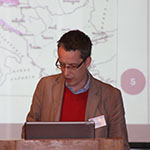Euroacademia Conferences
 Europe Inside-Out: Europe and Europeanness Exposed to Plural Observers (9th Edition) April 24 - 25, 2020
Europe Inside-Out: Europe and Europeanness Exposed to Plural Observers (9th Edition) April 24 - 25, 2020 Identities and Identifications: Politicized Uses of Collective Identities (9th Edition) June 12 - 13, 2020
Identities and Identifications: Politicized Uses of Collective Identities (9th Edition) June 12 - 13, 2020 8th Forum of Critical Studies: Asking Big Questions Again January 24 - 25, 2020
8th Forum of Critical Studies: Asking Big Questions Again January 24 - 25, 2020 Re-Inventing Eastern Europe (7th Edition) December 13 - 14, 2019
Re-Inventing Eastern Europe (7th Edition) December 13 - 14, 2019 The European Union and the Politicization of Europe (8th Edition) October 25 - 26, 2019
The European Union and the Politicization of Europe (8th Edition) October 25 - 26, 2019 Identities and Identifications: Politicized Uses of Collective Identities (8th Edition) June 28 - 29, 2019
Identities and Identifications: Politicized Uses of Collective Identities (8th Edition) June 28 - 29, 2019 The European Union and the Politicization of Europe (7th Edition) January 25 - 26, 2019
The European Union and the Politicization of Europe (7th Edition) January 25 - 26, 2019 7th Forum of Critical Studies: Asking Big Questions Again November 23 - 24, 2018
7th Forum of Critical Studies: Asking Big Questions Again November 23 - 24, 2018 Europe Inside-Out: Europe and Europeanness Exposed to Plural Observers (8th Edition) September 28 - 30, 2018
Europe Inside-Out: Europe and Europeanness Exposed to Plural Observers (8th Edition) September 28 - 30, 2018 Identities and Identifications: Politicized Uses of Collective Identities (7th Edition) June 14 - 15, 2018
Identities and Identifications: Politicized Uses of Collective Identities (7th Edition) June 14 - 15, 2018
Eastern, Central, or East-Central Europe? Identity Dilemmas in Contemporary Poland
-
-

-
Presentation speakers
- Adam F. Kola, Institute of Slavonic Philology, Nicolaus Copernicus University, Toruń, Poland
- Download presentation
Abstract:
Poland, from the United States’ perspective, is the matter of Eastern Europe, while for Western Europe it constitutes eastern borders of European Union. In turn, Polish neighbors – the Czechs (J. Kroutvor, M. Kundera, J. Křen, etc.) – are attached to the concept of Central Europe, what in the 1980s and 1990s found many followers in Poland. However, at present, the opinion that Poland is situated in East-Central Europe predominates in this country. All these terms bear various traditions and evoke different connections. Firstly, the objective of this paper is to show in what manner Central and East-Central Europe is perceived in Poland, secondly – to point at cultural and historical background and socio-political meaning of particular ideas. Since all these notions are casual and conditioned both politically and historically, and they also correspond with affairs of certain political, business and academic groups. What is more, ideas hidden behind these notions are intellectual constructs and as such they are often subjected to manipulations. In this context there are at least two pivotal questions: how these heritages form the present Polish identity? What kind of author’s strategies of contriving the problems mentioned above are possible? In the paper I will take into consideration different discourses in comparison, among the others historical/historiographical (Halecki, Kłoczowski, Wandycz, Piotrowski), cultural “activists” or “the practitioners of ideas” (Giedroyć, Czyżewski) and writers (Miłosz, Stasiuk). The paper is extension of my recent book Europa w dyskursie polskim, czeskim i chorwackim. Rekonfiguracje krytyczne [Europe in Polish, Czech and Croatian Discourse. Critical Reconfigurations, Toruń 2011] where I focus on transnational dimensions of the category of “Europe”, whereas herein I would like to take a step backwards to the Polish context, but with a deeper interpretation in junction with the problem of identity in the society in transition.
-
Related Presentations

West versus East – A Question of Trust
- George Yuryev and Ekaterina Bagreeva

Uncovering Romania by Geography. A Study on How Geography in Romania Cultivated Lands and Romanians
- Cosmina Paul

Czech Modernity As Secular Modernity
- Roman Vido















